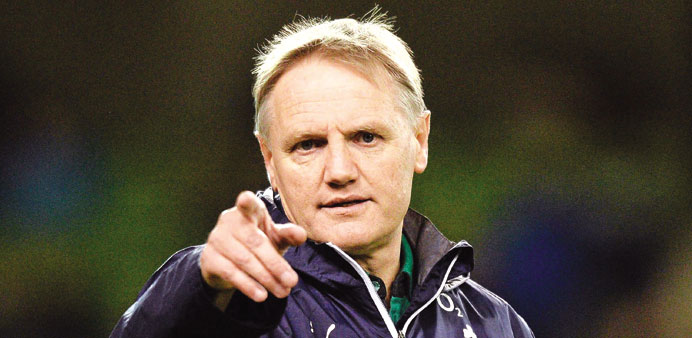AFP/London
“It builds coronaries for coaches but it also builds character,” was Ireland coach Joe Schmidt’s summation of the crazy final day climax to the Six Nations but that may pale into insignificance as his first World Cup campaign approaches.
The 49-year-old New Zealander—who guided Ireland to only their second successful defence of the Five/Six Nations trophy with the previous one dating back to 1948/49 -- may not have suffered a coronary but he has shown he is as tough as teak.
For last November he gritted his teeth and sat up in the coaching staff box at Lansdowne Road to oversee Ireland beat Australia before being rushed to hospital with appendicitis.
He has moulded the present Ireland side into a similarly tough outfit, no longer saddled with the epithet of ‘brave in defeat’, that has seen them win 13 of their past 16 Tests, worryingly two of those came in their last two warm-up games including another loss to seemingly their bogey team Wales, coached by former Ireland handler Warren Gatland, who earlier this year ended their hopes of a record successive win streak of 11.
No mean feat after being at the helm for just two years when one compares his achievements to the underwhelming record of France coach Philippe Saint-Andre who has a far greater playing pool and in four years has failed to finish higher than fourth in the Six Nations.
He also took over a side that was demoralised after a woeful 2013 Six Nations campaign—and in good headmasterly style, a post he occupied in New Zealand, just as he had done at Leinster he whipped them into shape. He would sit down personally with each individual of his enlarged squad of around 50 players and address their strengths and weaknesses and add if this and that was done then come the series they would be up for selection.
On the outside he is a great communicator and willing to respond at length to questions, but insiders say he is also one who likes to keep a tight rein on things going on in the camp.
The eloquent Kiwi is also quick to defend his tactics especially after they came under fire for being effective but one dimensional—a stark contrast to the free flowing play of his Leinster side that won two European Cups and a Challenge Cup during his tenure.
Schmidt said that the modern game did not allow for simply throwing the ball around and making mad dashes up the pitch.
“One of the things I would say in modern rugby is that there are a lot of big men on the pitch that isn’t quite as big,” said Schmidt. “It may look quite big depending on how far up the stand you are, but there’s not a heck of a lot of room out there.
“Therefore I believe you’ve got to be three-dimensional in attack. If you play a two-dimensional game, you can only pass the ball backwards so if you want to go forwards you have to pass it backwards and then carry it forward.
“The only other way to progress the ball is to use the boot so you have got to be proficient in using all three aspects of the game.”
Schmidt’s success and ability to focus has been all the more remarkable given his 11-year-old son Luke suffers from epilepsy as a result of a brain tumour he had when he was four—a factor which almost persuaded him to decline the Irish job and return to New Zealand.
Indeed just after the Six Nations success he darted off abroad with Luke to seek help from specialists and he hopes too that his high profile can help others who suffer from the illness. “There are 40,000 people with epilepsy in Ireland, so if I can help raise awareness of the condition, then hopefully that’s a positive.”

Joe Schmidt
